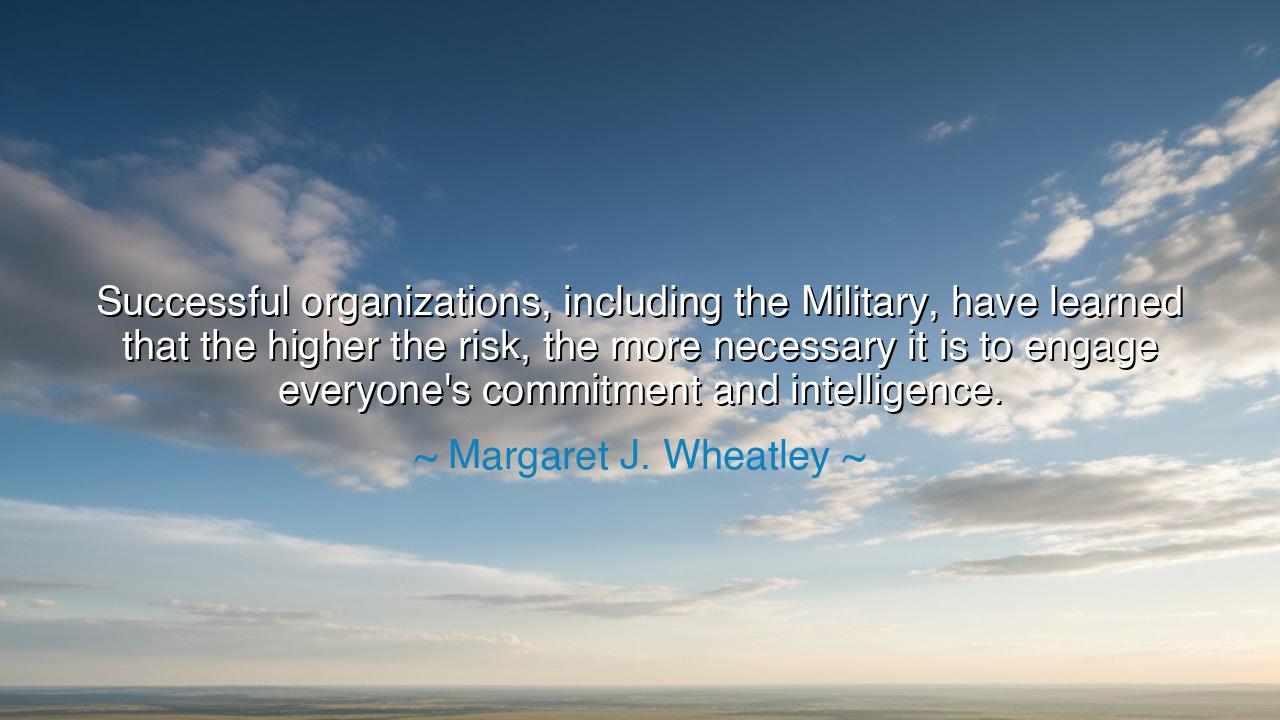
Successful organizations, including the Military, have learned
Successful organizations, including the Military, have learned that the higher the risk, the more necessary it is to engage everyone's commitment and intelligence.






When Margaret J. Wheatley declared, “Successful organizations, including the Military, have learned that the higher the risk, the more necessary it is to engage everyone's commitment and intelligence,” she spoke not only as a thinker of leadership but as a seer of human nature. Her words remind us of a truth as old as civilization itself: that great challenges cannot be met by command alone, but only by the united hearts and minds of all who serve the cause. In moments of danger, when the stakes are high and the path uncertain, it is not authority that saves the day—it is shared purpose, collective wisdom, and the full awakening of the human spirit.
The origin of Wheatley’s wisdom lies in her lifelong study of organizational behavior, systems thinking, and the patterns of life itself. She saw that every living system—from the smallest cell to the mightiest army—thrives through cooperation, not control. The old model of hierarchy, where orders descend and obedience ascends, fails when the ground trembles beneath risk. In such times, survival depends not on the voice of one, but on the intelligence of many. Like the body that moves as one through countless unseen signals, an organization achieves its greatest strength when every part is alive, aware, and committed to the whole.
Her mention of the Military is no accident. The history of war is a history of leadership tested under fire. The generals of old who sought victory through fear and command alone often found ruin. But those who trusted their soldiers, who trained them not just to obey but to think—to act with initiative, courage, and clarity—won victories that reshaped the world. Consider General Dwight D. Eisenhower, who led the Allied forces during World War II. He did not rule through tyranny or isolation. Instead, he cultivated a shared sense of mission, a spirit that united soldiers from many nations under one vision: the defense of freedom. When D-Day came—the greatest gamble of the war—it was not Eisenhower’s mind alone that secured success, but the collective intelligence of thousands who acted with understanding and conviction.
This is the essence of Wheatley’s teaching: that leadership is not domination, but invitation. The leader does not hold the torch alone; they kindle it in every hand. When risk rises—when failure would mean disaster—the wise do not tighten their grip on control. They open the circle, calling forth the creativity, knowledge, and commitment of all. For in the heat of trial, the smallest voice may speak the truth that saves the mission. A plan made by one mind is fragile; a plan shaped by many minds becomes living and resilient.
The ancients understood this, too. In the councils of Athens, before embarking on great ventures, the citizens gathered to deliberate. They believed that wisdom was not the possession of one, but the gift of the many. And though their democracy was imperfect, it revealed a sacred truth: collective intelligence is the foundation of strength. When the people are silenced, a nation decays. When they are engaged, it thrives, even amidst peril. So too it is in every organization, family, or community—the higher the risk, the more vital it becomes to awaken the shared mind.
From Wheatley’s insight flows a lesson for every generation: true success is communal. No leader, however brilliant, can carry the weight of uncertainty alone. The wise seek counsel, the humble empower others, and the courageous invite participation. When faced with challenge, gather your people not as subordinates, but as partners in destiny. Speak to their intelligence, appeal to their courage, and honor their potential. For only when all hearts are engaged does the impossible become achievable.
Therefore, let these words be engraved upon the hearts of all who lead: in times of great risk, unity is the highest wisdom. Do not hide behind authority; awaken the intelligence around you. For every mind is a fortress of insight, every heart a reservoir of courage. When the fire of purpose burns in many souls, it becomes a light that no darkness can extinguish. So lead not by fear, but by trust, not by command, but by connection—and your organization, like a living organism, will endure the storm and rise renewed, stronger than before.
In the end, Wheatley’s teaching is both ancient and eternal: that the fate of every endeavor—be it an army, a company, or a nation—rests not in the power of one leader, but in the collective strength of all who believe. Let this truth guide you: in moments of danger, call upon every heart; in moments of doubt, awaken every mind; and in moments of triumph, remember—it was never you alone, but all of you together, that made the dream endure.






AAdministratorAdministrator
Welcome, honored guests. Please leave a comment, we will respond soon